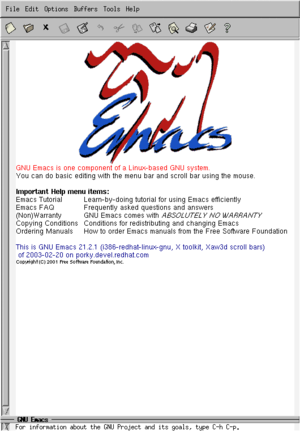GNU Emacs
|
|
GNU Emacs is one of the two most popular versions of Emacs (see also XEmacs). The GNU Emacs manual describes it as "the extensible, customizable, self-documenting, real-time display editor."
Since so much of the user interface of GNU Emacs and XEmacs is the same, a combined introduction is available in Emacs.
| Contents |
Distribution
GNU Emacs is free software, distributed under the terms of the GNU GPL.
The source code and binaries are available via FTP from the GNU project website (see below). They are also widely available from other sites on the Internet. Vendors of Unices, both free and proprietary, frequently provide Emacs bundled with the operating system.
GNU Emacs runs on a large number of platforms, including GNU/Linux, FreeBSD, most Unices, Mac OS Classic, Mac OS X, and Microsoft Windows.
Development
GNU Emacs is part of the GNU project, and is under active development. Several, but not all, of the developers are affiliated with the Free Software Foundation (FSF).
As of 2004, the latest release of GNU Emacs is version 21.4. Development takes place in a single CVS trunk, which is at version 22.0.50. The current maintainer is Richard Stallman.
Until 1999, GNU Emacs development was relatively closed, to the point where it was used as an example of the "Cathedral" development style in The Cathedral and the Bazaar. The project has since adopted a public development mailing list and anonymous CVS access. As with all GNU projects, it remains policy to accept significant code contributions only if the copyright holder assigns the code's copyright to the FSF, although one exception was made to this policy for the MULE (MULtilingual Extension) code [1] (http://mail.gnu.org/archive/html/bug-gnu-emacs/2000-09/msg00065.html) since the copyright holder is the Japanese government and copyright assignment was not possible. This does not apply to extremely minor code contributions or bug fixes -- but beware that the definition of minor is 10 lines of code or less. This policy is intended to facilitate copyleft enforcement, so that the FSF can defend the software in a court case if one arises. This requirement by the GNU Emacs maintainers is assumed to affect contributions. Enforcement provides legal confidence in the GNU Emacs free software license -- the GNU General Public License -- and in the free software itself -- an intellectual work with many copyrights and contributors.
References
- Stallman, Richard M. (2002). GNU Emacs Manual. 15th ed. Boston, Massachusetts: Free Software Foundation. ISBN 1-882114-85-X.
- Rosenblatt, Bill; Raymond, Eric S.; Cameron, Debra. (1996). Learning GNU Emacs. 2nd ed. O'Reilly & Associates. ISBN 1565921526.
- Cameron, Debra; Elliott, James; Loy, Marc. (December 2004). Learning GNU Emacs, 3rd ed. O'Reilly & Associates. ISBN 0596006489.
- Glickstein, Bob. (April 1997). Writing GNU Emacs Extensions. O'Reilly & Associates. ISBN 1-56592-261-1.
External links
- The GNU Emacs homepage (http://www.gnu.org/software/emacs/emacs.html) including
- GNU Emacs Manual. 15th ed. (Emacs 21.3). GNU Press, 2002 (http://www.gnu.org/software/emacs/manual/) – Online version (HTML from texinfo), published under the GFDL
- An Introduction to Programming in Emacs Lisp (http://www.gnu.org/software/emacs/emacs-lisp-intro/). 2nd ed. By R. Chassell
- GNU Emacs FAQ (http://www.gnu.org/software/emacs/emacs-faq.text)
- GNU Emacs FAQ For Windows 95/98/ME/NT/XP and 2000 (http://www.gnu.org/software/emacs/windows/ntemacs.html)cs:Emacs
de:Emacs es:Emacs eo:Emacs fr:GNU Emacs he:Emacs ia:Emacs it:Emacs ja:Emacs ko:Emacs nl:Emacs pl:Emacs pt:Emacs ru:Emacs sv:Emacs zh:Emacs

